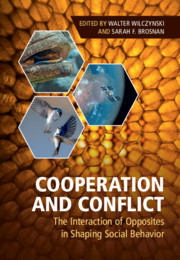Book contents
- Cooperation and Conflict
- Cooperation and Conflict
- Copyright page
- Dedication
- Contents
- Contributors
- Acknowledgments
- Introduction
- Part I Broad Insights from Political Science to Molecular Behavior
- 1 Cooperation and Conflict in International Relations
- 2 Internalizing Cooperative Norms in Group-Structured Populations
- 3 Reputation
- 4 Finding the Right Balance
- Part II Neural Mechanisms
- Part III Species Comparisons
- Index
- References
2 - Internalizing Cooperative Norms in Group-Structured Populations
from Part I - Broad Insights from Political Science to Molecular Behavior
Published online by Cambridge University Press: 08 February 2021
- Cooperation and Conflict
- Cooperation and Conflict
- Copyright page
- Dedication
- Contents
- Contributors
- Acknowledgments
- Introduction
- Part I Broad Insights from Political Science to Molecular Behavior
- 1 Cooperation and Conflict in International Relations
- 2 Internalizing Cooperative Norms in Group-Structured Populations
- 3 Reputation
- 4 Finding the Right Balance
- Part II Neural Mechanisms
- Part III Species Comparisons
- Index
- References
Summary
The success of humans in spreading through all of Earth’s ecosystems and transforming them at planetary scale is directly dependent on our capacity to cooperate in large groups and self-organize in complex social structures that sustain such cooperation. One of the main components of such large-scale cooperation is the human capacity and propensity for inventing and following social norms (Ostrom, 2000; Fehr and Schurtenberger, 2018). Social norms influence almost all aspects of human behavior, providing a “grammar of society” (Bicchieri, 2005, 2010) that constrains and enables different kinds of individual behaviors, coordinates collective behavior, and sustains cooperation in the face of conflicts of interests.
- Type
- Chapter
- Information
- Cooperation and ConflictThe Interaction of Opposites in Shaping Social Behavior, pp. 26 - 44Publisher: Cambridge University PressPrint publication year: 2021
References
- 3
- Cited by



